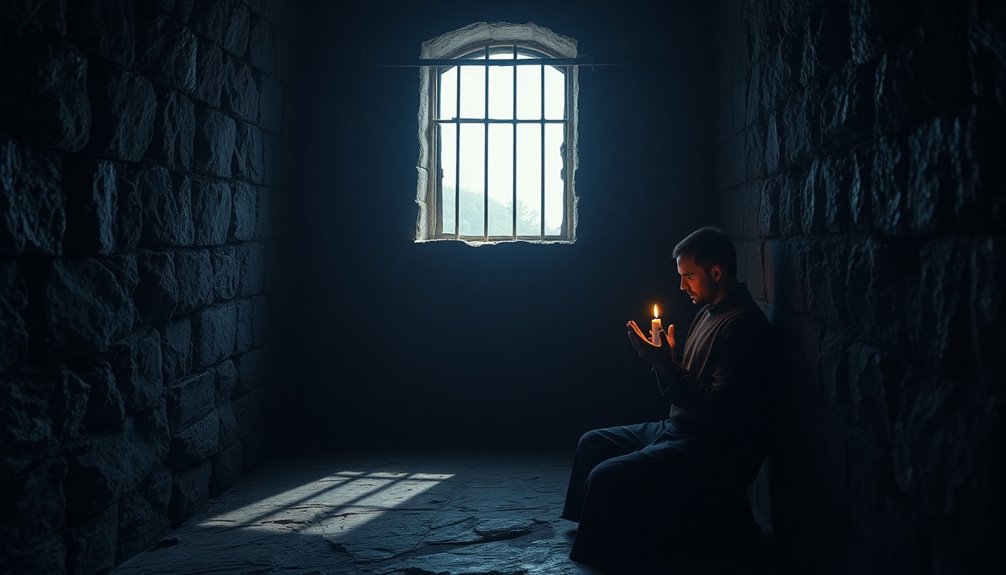John the Baptist died by beheading at the order of Herod Antipas. This tragic event stemmed from John's fearless criticism of Herod's marriage to Herodias, which was deemed unlawful. During a birthday banquet, Herodias's daughter, Salome, danced for Herod and requested John's head on a platter, under her mother's influence. Herod, fearing backlash from the public and conflicted about his respect for John, agreed to this grim demand. John's death became a powerful symbol of courage and fidelity to truth. If you're curious about the implications of his martyrdom, there's much more to uncover.
Key Takeaways
- John the Baptist was executed by beheading, ordered by Herod Antipas after a request from Salome during a birthday banquet.
- Herodias, driven by resentment towards John for condemning her marriage to Herod, influenced Salome's request for John's head.
- Herod Antipas initially imprisoned John to neutralize him as a political threat, reflecting his struggle with moral and political pressures.
- After John's execution, his disciples respectfully buried his body, honoring him as a martyr and prophet.
- John's death symbolizes the dangers faced by truth-tellers and the cost of standing firm against injustice.
Introduction

John the Baptist's death is a pivotal moment in the New Testament, revealing the complexities of power, morality, and personal conviction. His execution, ordered by Herod Antipas, came after John condemned Herod's marriage to Herodias, his brother's wife.
This conflict escalated during a lavish birthday banquet, where Herodias' daughter, Salome, danced for Herod, earning his admiration. Under pressure from Herodias, who sought revenge on John, Herod was coerced into making a rash promise to Salome: she could have anything she desired. Tragically, she asked for the head of John on a platter.
Despite Herod's initial hesitation, rooted in his respect for John as a righteous man, he ultimately gave in to the demands of his guests and his own desire to save face. This decision marked a significant moment in the tension between personal conviction and political expediency.
After the brutal execution, John's disciples came and took his body for burial, underscoring the profound impact his death had on his followers and the early Christian community.
John's martyrdom became a powerful symbol of steadfast faith in the face of moral corruption and tyranny.
Biblical Martyrdom References

When you explore the biblical references to martyrdom, you'll find that John's story is primarily captured in the Gospels of Matthew and Mark.
These accounts not only record his brutal execution by Herod but also reflect the inner turmoil Herod faced.
As you consider these primary references, you'll also want to look at secondary ones that connect John's fate to the broader tradition of martyrdom in the Scriptures.
Primary Bible References
In the Gospels of Matthew and Mark, you can find the primary biblical references detailing the martyrdom of John the Baptist. In Matthew 14:1-12 and Mark 6:19-29, the narrative reveals how John was beheaded by Herod Antipas.
Herodias, filled with resentment over John's condemnation of her marriage to Herod, manipulates her daughter Salome into asking for John's head on a platter during Herod's birthday party.
Despite Herod's initial reluctance to execute John due to his righteousness, he ultimately succumbs to the pressure of his oath made in front of his guests. This tragic event underscores the tension between political authority and the prophetic truth that John represented.
After John's execution, his disciples respectfully retrieve his body and bury it, highlighting the deep reverence held for him as a prophet.
These accounts in the Gospel of Matthew and Mark serve not only as historical records but also as poignant reminders of the dangers faced by those who challenge immoral actions from those in power.
John's martyrdom illustrates the high cost of standing firm in one's beliefs, even in the face of death.
Secondary Bible References
Throughout the New Testament, several secondary references shed light on the significance of John the Baptist's martyrdom. The Synoptic Gospels—Matthew, Mark, and Luke—offer crucial insights into his execution. In Matthew 14:1-12 and Mark 6:19-29, you see Herod's internal conflict and Herodias' vengeful motives that ultimately led to John's beheading. Luke 3:19-20 briefly recounts John's imprisonment by Herod for rebuking him about his marriage to Herodias, foreshadowing the tragic end.
John's martyrdom serves as a powerful symbol in Christian teachings, often likened to Jesus' own suffering and death. His execution is viewed as a testament to prophetic rejection and the cost of speaking truth to power.
The Gospel of John (1:19-27) positions John the Baptist as a key witness to Christ, anchoring his faithfulness in calling for repentance. Acts 13:25 further emphasizes John's role in preparing the way for Jesus, culminating in his martyrdom as a pivotal moment in early Christianity.
These secondary references enrich your understanding of John the Baptist's vital contribution to the faith and the profound implications of his tragic death.
Herod's Political Motivations

Amidst the political turbulence of his reign, Herod Antipas faced significant pressure from both Herodias and the public regarding John the Baptist's rising influence. As a Tetrarch under Roman authority, you understand that maintaining power requires careful navigation of political landscapes.
Herod knew that John's growing following could ignite rebellion, so he initially imprisoned him to neutralize the perceived threat. However, the internal conflict within Herod deepened. He respected John as a righteous man but ultimately succumbed to Herodias' relentless demands to silence John's criticism of their marriage.
The execution of John was a politically motivated decision, made during a reckless moment at a birthday banquet, where Herod rashly vowed to grant Herodias' daughter any wish. After John was beheaded, Herod Antipas experienced guilt and regret, realizing too late the heavy political repercussions of his choice.
The weight of public perception loomed large over his reign, and this execution highlighted the precarious balance he'd to maintain between personal desires and the expectations of those around him. In the end, the cost of his political motivations was far more than just a life lost; it was a burden he'd carry.
Cultural Context of Martyrdom

Martyrdom held significant cultural weight in the ancient world, shaping how people viewed unwavering commitment to one's beliefs. This powerful concept often led to persecution and execution, as exemplified by John the Baptist. His beheading by Herod Antipas serves as a stark reminder of the political and religious tensions of the time, illustrating the grave consequences faced by those who dared to challenge authority.
In early Christianity, figures like John the Baptist became revered symbols of faithfulness and courage in the face of death. His martyrdom didn't just mark the end of his life; it became a pivotal moment that shaped the beliefs of his followers.
After John's execution, his disciples honored him by burying his body, highlighting the cultural significance of preserving the memory of martyrs.
The narrative of John's death parallels other biblical figures, reinforcing the theme of sacrificial death as a pathway to spiritual significance and legacy. This legacy continues to resonate with many, reminding you that martyrdom isn't just an act of defiance; it's a profound commitment to one's beliefs, inspiring generations to uphold their values in challenging times.
Misunderstandings About Herod's Motives

When you look at Herod's actions, it's easy to jump to conclusions about his character.
Many misunderstandings surround his true motives, especially regarding his fear of losing power and the pressure from Herodias.
Debunk Herod's Character Misconceptions
In examining Herod's motives, it's important to recognize that his actions were shaped by a complex mix of political pressure and personal conflict.
Herod Antipas initially respected John the Baptist, intrigued by his teachings. This respect complicated his decision to execute John, especially under the relentless demands of Herodias. Rather than a personal vendetta, the execution was largely influenced by Herod's fear of losing his political reputation.
Herod understood the risk of public backlash, given John's significant following and the potential for unrest among the people. His internal conflict is evident; he struggled with guilt after John's death, which underscores that his motivations weren't purely driven by malice. Instead, they stemmed from a desire to maintain authority and avoid appearing weak.
Moreover, Herod's fear that John might rise again—possibly in the form of Jesus—reflects a deeper concern about the influence of prophetic figures. This anxiety added layers to his decision-making, showcasing that Herod's character is often misunderstood.
Rather than a tyrant, he was a ruler caught between personal respect and the harsh realities of leadership.
Herod's Fear of Losing Power
Herod's struggle to maintain power often stemmed from a deep-seated fear of losing his authority, particularly in light of John the Baptist's rising influence. The growing popularity of John among the people unnerved Herod, leading him to imprison John rather than execute him outright. He respected John's prophetic nature, which only heightened his anxiety about the potential backlash from the public.
Herodias, driven by her own vendetta, relentlessly pushed for John's execution. Yet, Herod hesitated, caught in a conflict between his fear of losing power and the moral implications of executing a righteous man. His concerns about public opinion loomed large, making him wary of acting too hastily.
Ultimately, when Herod promised Salome anything she desired during his birthday banquet, he felt cornered. The beheading of John became a politically motivated decision, driven by the need to uphold his reputation and authority.
Later, Herod's fear escalated to believing that Jesus was actually John resurrected, highlighting how deeply John's influence haunted him. Herod's actions reveal a ruler gripped by insecurity, willing to sacrifice even an innocent life to maintain his tenuous grip on power.
Faith in Adversity Lessons

When you think about John the Baptist, consider the courage he showed by speaking truth to power, even at the cost of his life.
His bravery highlights the importance of standing firm in your beliefs, especially during tough times.
Plus, the loyalty of his followers reminds us that community support can make a significant difference in facing adversity.
Courage in Speaking Truth
Speaking truth to power often requires immense courage, a lesson vividly illustrated by the life and death of John the Baptist. You can see how John boldly confronted Herod Antipas, rebuking him for marrying Herodias, despite knowing the personal risk involved.
His unwavering commitment to his convictions showcased the profound cost of standing firm against moral corruption. John's actions emphasized the need for accountability in leadership, reminding us that even those with power must adhere to God's laws.
He didn't shy away from calling out injustice, understanding that the truth sometimes comes at a high price. His martyrdom serves as a stark reminder of the potential backlash that comes with speaking out, yet it also highlights the importance of faith during adversity.
John remained steadfast in his mission to call for repentance, even when faced with lethal consequences. His life and death illustrate that true courage involves not just believing in the truth but also standing up for it, regardless of the risks.
Ultimately, John's legacy challenges you to embody that same courage in your own life, advocating for truth and accountability, no matter the obstacles you may face.
Community Courage in Adversity
In the face of adversity, community courage often shines brightest, as seen in the aftermath of John the Baptist's death. John boldly confronted King Herod Antipas about his immoral marriage to Herodias, fully aware of the potential consequences. His unwavering commitment to righteousness demonstrated how crucial it's to stand firm in your beliefs, even when facing danger.
When Herod executed John, his disciples didn't falter. Instead, they rallied together, showing remarkable solidarity as they retrieved and buried his body. This act of courage reflected their deep respect for their leader and their commitment to his message. Their actions remind you that a community can rise against oppression and honor those who fight for truth, even when the cost is high.
John's legacy continues to inspire you and countless others to advocate for justice, encouraging you to stand up against moral failings in your own life. His story serves as a powerful reminder that courage in adversity can leave a lasting impact, motivating future generations to uphold integrity and truth amidst challenges.
Herod's Fear of John

Although Herod Antipas initially imprisoned John the Baptist, his fear of the prophet's growing influence and popularity among the people only intensified over time. You can see how Herod recognized that John's righteousness and strong moral stance made him a significant religious figure, commanding respect that posed a direct threat to Herod's authority.
The more people rallied around John, the more anxious Herod became about potential unrest or revolt.
Herodias, Herod's wife, fueled this fear further. Her dislike for John, driven by his condemnation of her marriage to Herod, created political pressure on Herod to act decisively.
Despite his internal conflict, Herod ultimately succumbed to the demands for John's execution to appease Herodias and avoid backlash from the public.
Even after John's death, Herod's fear lingered. He experienced guilt and regret, believing that John might've returned as Jesus, intensifying his anxiety over the consequences of his actions.
This ongoing fear illustrates how Herod's decision wasn't just a matter of removing a rival but a complex interplay of personal conviction and the heavy weight of political pressures.
Additional Resources

For anyone interested in delving deeper into the life and death of John the Baptist, a variety of resources are available. You can start your journey with the New Testament Gospels of Matthew (14:1-12) and Mark (6:19-29), which document John's execution by beheading on the orders of Herod Antipas.
These passages highlight the influence of Herodias and her daughter Salome in orchestrating this tragic event during a birthday banquet.
To explore more about John's legacy, consider reading historical texts and commentaries that analyze the socio-political context of his life. Books on early Christianity often discuss how John's disciples retrieved and buried his body, ensuring his memory lived on as a significant religious figure.
You might also look into archaeological studies regarding the various sites claiming to hold John's relics, such as the Umayyad Mosque in Damascus.
Documentaries and lectures on early Christian figures can provide insightful interpretations of his impact. Ultimately, these resources will enrich your understanding of John the Baptist's martyrdom and the complex dynamics surrounding his execution.
Frequently Asked Questions
How Did John Die According to the Bible?
According to the Bible, John the Baptist faced a tragic end.
You'll find that he was imprisoned by Herod Antipas due to his criticism of Herod's marriage.
During a banquet, Herodias' daughter, Salome, danced and asked for John's head on a platter.
Despite his respect for John, Herod succumbed to the pressure of his guests and ordered the execution.
John's disciples later buried him, marking the end of his prophetic ministry.
How Long After John the Baptist Died Did Jesus Die?
You'll find that Jesus died about three years after John the Baptist's execution.
While precise dates aren't clearly documented, it's generally accepted that John was executed around A.D. 30, with Jesus' crucifixion occurring around A.D. 33.
This timeline highlights the significant impact John's death had on Jesus' ministry and the growing tensions with the authorities, shaping the events that followed in the early years of Christianity.
What Did Jesus Say About John the Baptist?
When you look at what Jesus said about John the Baptist, you see He regarded him as the greatest prophet.
Jesus described John as the messenger who prepared the way for Him, fulfilling prophecy. He expressed deep sorrow over John's death, highlighting the importance of John's ministry.
Additionally, Jesus noted the contrasting lifestyles between them, showing how both faced criticism from people, yet underscoring John's role in pointing others to the light.
Why Was John the Baptist Not an Apostle?
John the Baptist wasn't an apostle because his mission focused on preparing the way for Jesus rather than forming a discipleship group.
While he'd followers, his primary role was to testify about Jesus and emphasize repentance through baptism.
His ministry preceded Jesus', and he recognized Jesus' importance, declaring that Jesus must increase while he must decrease.
This unique position highlights John's prophetic status rather than an apostolic one.










